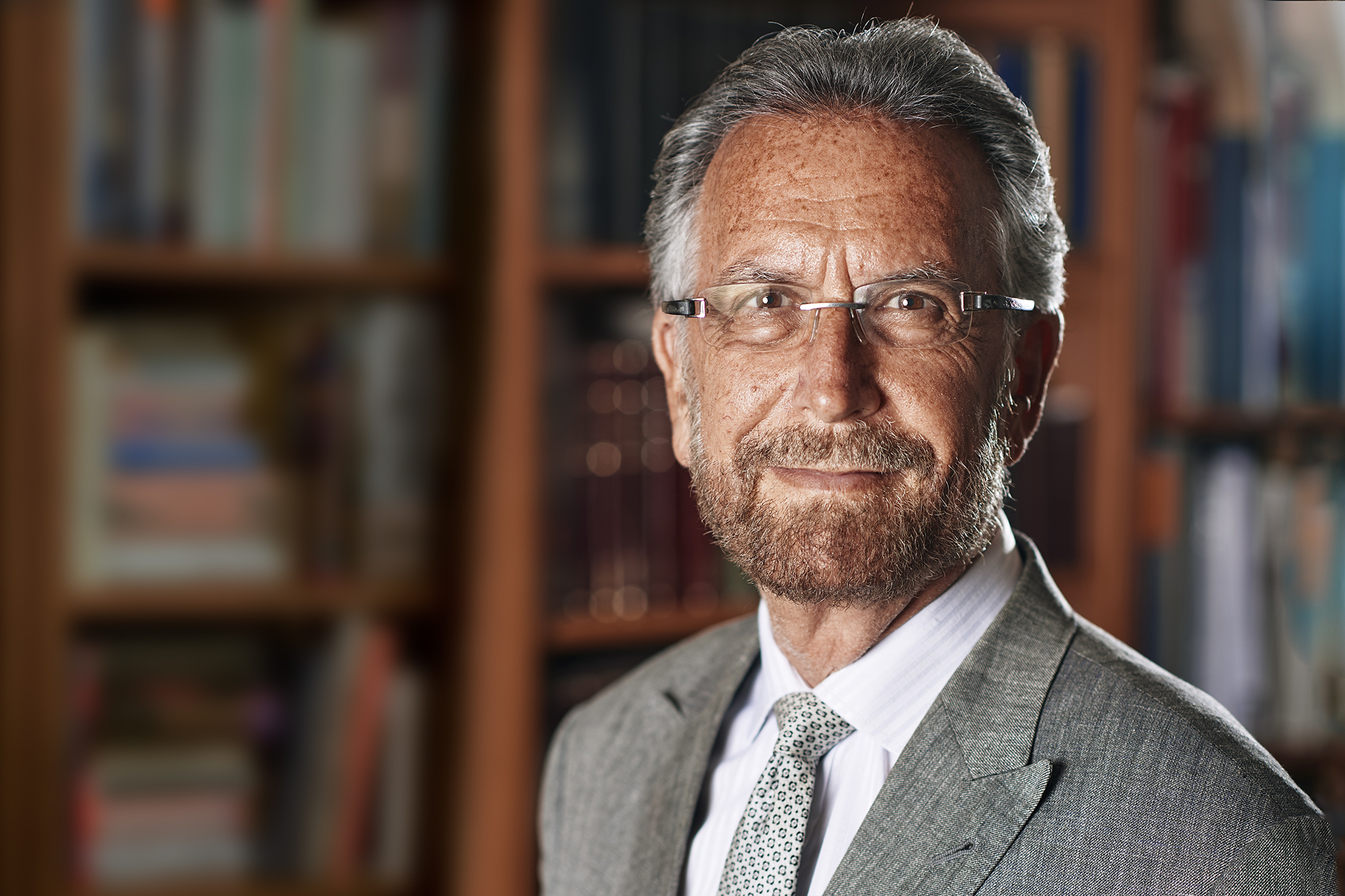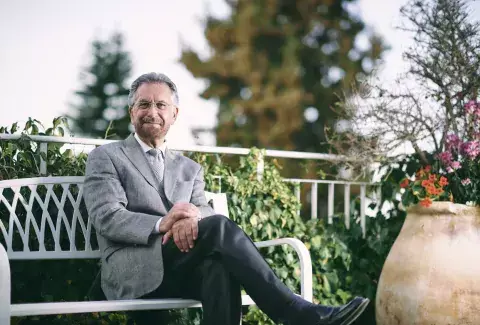
When it comes to the twin issues of climate change and environmental justice, Chief Rabbi David Rosen is uncompromising.
“There’s no issue more important,” he said in a recent interview with KAICIID. “Of all the very significant things that need to be done in our world, what is their value if we are going to destroy it all? Our responsibility is a critical imperative for the survival of life on earth itself.”
A former Chief Rabbi of Ireland and senior rabbi of the largest Orthodox Jewish congregation in South Africa, Rosen is a prominent interreligious leader. As such, he is the American Jewish Committee’s International Director of Interreligious Affairs and a member of the KAICIID Board of Directors.
Of all aspects of his work in interreligious dialogue and education, his greatest passion remains the care of the environment and the need to reform our lifestyles accordingly.
“As a religious practitioner, I believe that there is no issue today that is as compelling or imperative for religious people to be engaged with,” he said.
In addition to his work with KAICIID, Rosen has worked with Religions for Peace (RfP) and the Parliament of the World Religions on a variety of interreligious efforts aimed at combatting the calamitous effects of climate change. He frequently writes, speaks, and is actively engaged with multiple initiatives addressing the challenges posed by climate change.
Two of those initiatives are the Jerusalem-based Interfaith Centre for Sustainable Development (ICSD) and the Interfaith Rainforest Initiative — an international, multi-faith alliance that “works to bring moral urgency and faith-based leadership to global efforts to end tropical deforestation.”
Rosen's convictions arise out of a deep personal appreciation of the environment as a gift from God.
At the heart of the Biblical narrative, he said, is the commandment to care for the cosmos, a reverence for – and safe keeping of – the work of the Creator.
“If religion — and this is true of Abrahamic religions and most Dharma traditions as well — affirms that the cosmos is in fact a creation, that it is a manifestation of the divine power and presence, then how we relate to it and all that is within it, above all other sentient beings, is a manifestation of how we relate to God.
“Any act of disregard, let alone action that leads to a loss of species or degradation, is ultimately an impiety, an offense against God himself,” he said.
Above all, Rosen is driven by a need to persuade religious people that this is the single greatest spiritual imperative of our time.
To this end, he issued a passionate plea to a room full of representatives from across the spectrum of the world’s faiths at the 10th World Assembly of RfP in Lindau, Germany in 2019.
Underlining the responsibility of religious leaders and communities to engage and lead movements to preserve and sustain the environment — for both pragmatic and altruistic reasons — Rosen was categorical:
“A religion that doesn’t care about the environment isn’t worthy of the name,” he said to applause.
At that same assembly, Rosen witnessed religious and spiritual leaders affirming the need for urgent and decisive action to end tropical deforestation and combat deepening inequality and climate change by endorsing the Interfaith Rainforest Initiative’s “Faiths for Forests Declaration.”
Rosen believes more needs to be done in terms of policy and at the local level.
Read more here: Policymakers and Religious Leaders Discuss Climate Change at the G20 Interfaith Forum
When it comes to policymakers and scientists working with religious communities on issues such as climate change, Rosen feels there has been great progress in recent years.
“As in the field of conflict resolution, once upon a time, there was a normative disregard of religious communities by the diplomatic practitioners who saw religion as part of the problem,” he said, “they weren't totally wrong, but if you don't want religion to be part of the problem the answer isn't to ignore it, you need to make it part of the solution.”
Rosen believes that a change in this regard is taking place, including the challenge of environmental sustainability. "More and more", he says, “policymakers and the scientific establishment are working with religious communities to mobilise against environmental degradation. Indeed, one of the “silver linings” of the COVID-19 pandemic was the way in which religion and science have collaborated and the degree to which politicians have increasingly understood the need to engage religious leadership and communities.
“I believe in interreligious dialogue as an imperative in and of itself,” he said, “but even those who might not appreciate that they can understand the importance of pragmatic collaboration and cooperation.
“When it comes to the environmental issues we are obliged to address, we must work together to be greater than the sum of our different parts,” he adds.
On the question of what local faith communities can do, he believes that mobilising religious communities to advocate for certain policies, affirming declarations or promoting “green congregations,” is not enough. It is also a matter of drastically changing our lifestyles.
In particular, Rosen advocates veganism.

A 2019 report on climate change, desertification, land degradation, food security, and sustainable land management from the Intergovernmental Panel on Climate Change (IPCC) identified plant-based diets as a significant opportunity for mitigating the impact of climate change.
Commissioned by the United Nations (UN), the report said that by 2050, dietary adaptations could free up several million square kilometres of land and reduce CO2 emissions by up to eight billion tonnes per year. It concluded with a recommendation to reduce worldwide meat consumption.
“Changing our diet is even more important than recycling or cutting down on our carbon footprint in other ways,” Rosen said, “and today it’s a perfectly feasible thing to do.”
Speaking to his own constituency in a video produced for Jewish Veg — a U.S. based organization encouraging Jews to embrace plant-based diets — he declares that veganism is the new kosher for the 21st century.
But asking people to give up meat — especially those for whom meat is a part of their religious practice — can be a tall task, he concedes.
“When I come along as an Orthodox Rabbi and advocate veganism, I'm threatening traditional practice and a system, which poses a challenge not only for a structure of power and position, but also economic interest as well. And that's of course very, very difficult,” he said.
And yet, whether it is urging religious communities to abandon their addiction to meat-products, or the issue of climate change as a whole, Rosen remains optimistic.
“Why does the pessimist see the glass half empty and why does the optimist see it as half full?” Rosen said, “the pessimist comes down from on top expecting to see a full glass so therefore he's disappointed by what's missing, but the optimist knows that the glass was originally empty and sees everything in there and celebrates it all.”
This, Rosen said, is his attitude when it comes to the progress made on environmental issues, both within and beyond the global interreligious community.
“When you consider how engaged the world was 20 or 30 years ago and where we are today, there has been a dramatic shift.
“Most of us didn't even have environmental issues on our agenda 20 years ago and now it's a major focus of multi religious collaboration,” Rosen said, “Never before in human history has there been as much interfaith understanding and cooperation,” he adds.
The change, he emphasised, has been gradual. Nonetheless, he is convinced we are nearing an Archimedean point, where collaboration and innovation on the issues of climate change and environmental justice will increase exponentially.
“Part of the gift of being created in the divine image is the creative capacity to change the universe for better, as well as for worse,” he said, “especially with our modern technology we can find ways to deal with the challenges that we couldn’t before and I guess that’s one reason I’ve got immense optimism. I think that alone is enough to warrant a positive outlook on the future.”
How can religious leaders help reduce climate change? Read more here.